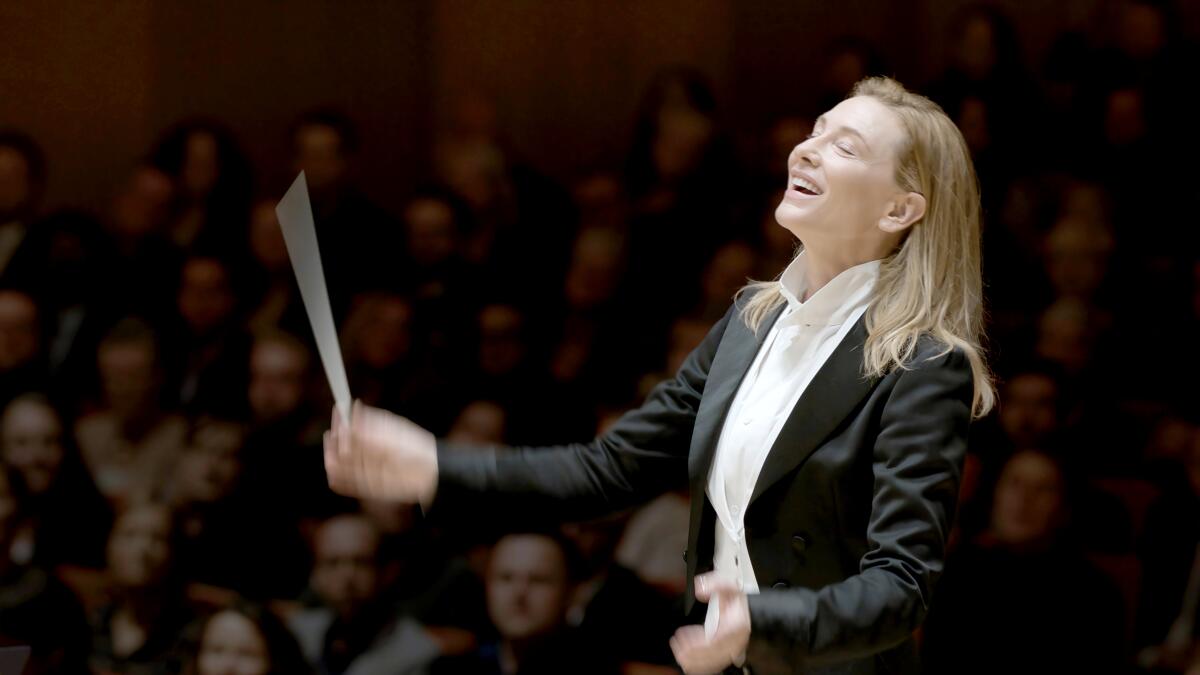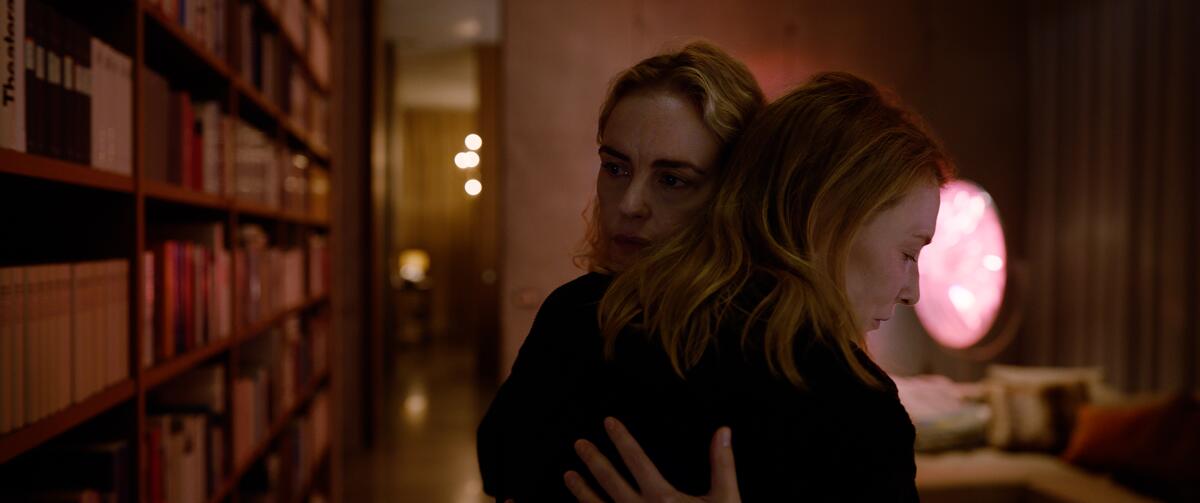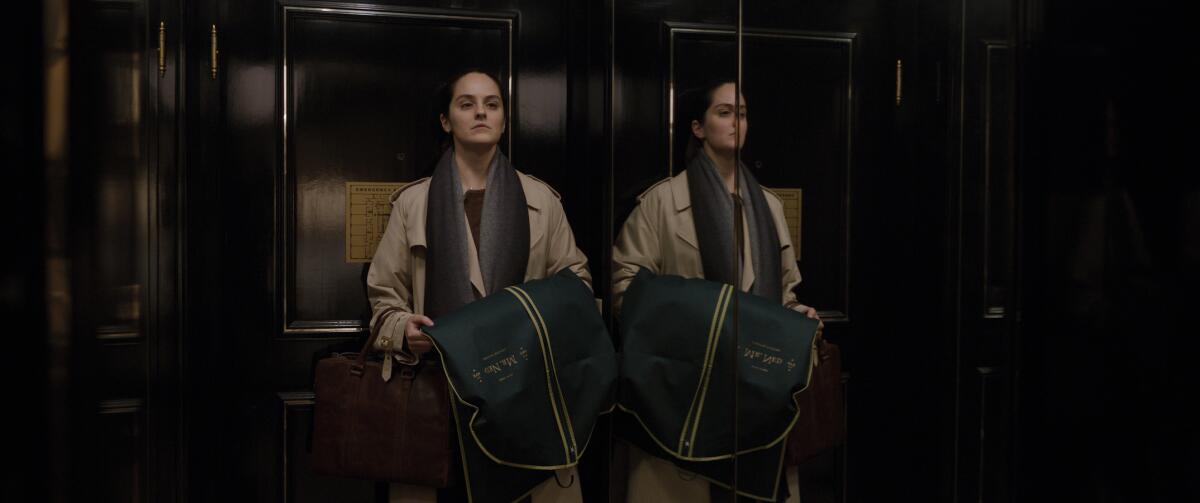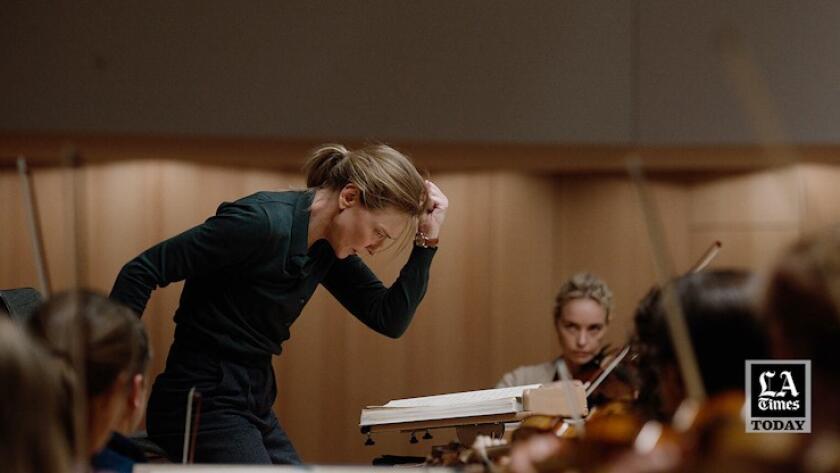Review: Cate Blanchett is at the peak of her powers in ‘Tár,’ a magnificent cinematic symphony

- Share via
It’s not until an hour into “Tár” that we see the title character — a classical conductor known the world over as Lydia Tár and played by an unimprovable Cate Blanchett — do what she was born to do. It’s an astonishing performance nestled inside another: In one shot, Lydia towers like a colossus over the podium and the camera, her face visible only to the musicians seated off-screen, her arms spread wide as if she were embracing or perhaps possessing the world. Classical music buffs, who will have a particular field day with this movie, will also have sharper observations than mine on the merits of Blanchett’s posture and baton technique. But this actor doesn’t even need to lift a baton, or approach a podium, to make us feel we’re in the presence of a singularly gifted musical body and mind.
A lesser movie — and one of the weird pleasures of “Tár” is that you can’t stop imagining the lesser movie it so easily might have been — would have introduced Lydia in full-blown maestro mode, so as to convince us of her genius at the outset. But writer-director Todd Field takes that genius as a given and trusts we’ll do the same; he respects the intelligence of the audience as surely as he does the magnificence of his star. And that respect is clear from the long, teasing reveal of an opening sequence: an onstage Q&A moderated by New Yorker writer Adam Gopnik (playing himself) that ushers us, with tasteful chuckles and radio-smooth applause, into Lydia’s rarefied cultural sphere.
For your safety
The Times is committed to reviewing theatrical film releases during the COVID-19 pandemic. Because moviegoing carries risks during this time, we remind readers to follow health and safety guidelines as outlined by the CDC and local health officials.
Gopnik rattles off an impressively varied (and deftly expository) list of Lydia’s professional accomplishments: not just all the prestigious orchestras she’s conducted but also the honors she’s received as a pianist, a composer, a teacher, an author, a scholar of Peruvian Indigenous music and a rare overachiever whose work straddles music, television, movies and theater. (Yes, she’s an EGOT winner.)
For the record:
11:50 a.m. Oct. 7, 2022An earlier version of this review incorrectly gave conductor Nadia Boulanger’s name as Natalia.
Lydia, casually resplendent in a simple black suit and open-necked white shirt, takes a moment to register all this praise before gently deflecting it. She describes her love for her heroes like Mahler and Leonard Bernstein, and she positions herself in a small, proud tradition of female conductors, including Nadia Boulanger and Antonia Brico. There’s a ticklish note of meta-pleasure to Blanchett’s performance: She may be playing the role of the conductor with impeccable poise, but so, of course, is Lydia herself.
The ability to perform greatness is itself a key component of greatness, as this pretty great movie knows. So is the illusion of approachability: In her self-deprecating asides and post-Q&A chitchat, Lydia extends the audience-flattering notion that we could even begin to understand what she does. She can describe, with breathtaking precision and self-assurance, the beauty of a composition or the methodology behind her hand movements. But what distinguishes “Tár” from so many good and bad movies about artists is its understanding that what we tidily refer to as genius — call it some elusive distillation of star quality, technical skill, intellectual acumen and pure, nervy instinct — can never truly be known, let alone filmed. It can only really be imagined.
And now Field, bringing a 16-year absence from filmmaking to a well-deserved end, has imagined Lydia’s inner and outer worlds with a clarity and rigor that makes 158 minutes fly by like a dream. If “time is the essential piece of interpretation,” as Lydia claims early on, then this filmmaker’s own mastery of cinematic time is worth singling out. So, for that matter, are the cool, somber precision of Florian Hoffmeister’s images, the fluidity of Monika Willi’s editing and the sleek, luxurious chill of Marco Bittner Rosser’s production design. If there’s a reason this movie flows so absorbingly, even with its decidedly andante pacing, it may be that Field’s storytelling draws no artificial distinction between the big and the small, the important and the mundane; everything we see and hear matters. And because each moment serves at least two purposes — “Tár” is both a superb character study and a highly persuasive piece of world building — you may well find yourself marveling at Field’s economy.
If there’s a governing logic to the story, it’s that in nearly every scene, Lydia is performing, and in every performance, she’ll reveal something she didn’t necessarily intend. That’s true whether she’s having an obligatory drink with a deep-pocketed investor (an oily Mark Strong) or teaching at Juilliard, where she cruelly humiliates a student, Max (Zethphan D. Smith-Gneist), in a virtuoso extended monologue. Lydia’s performing doesn’t end when she leaves New York and returns home to Germany, where she serves as chief conductor of the Berlin Philharmonic — another role she plays with note-perfect skill, captivating her colleagues and underlings with her dry, affable wit and unyielding authority.

For if Lydia is always performing, then she is also always conducting, ruthlessly directing, coordinating, manipulating and sometimes hushing the people in her life as if they were members of her own personal orchestra. Some of them, like Lydia’s bumbling assistant conductor (Allan Corduner) and aging, long-retired mentor (Julian Glover), are granted a brief, beautifully performed solo.
The most poignant of these comes from Sharon (the superb Nina Hoss), the orchestra’s first-chair violinist and Lydia’s longtime partner, with whom she shares a gorgeously cavernous apartment and a young daughter. Hoss, whose quiet, sympathetic gaze can register even the subtlest shifts in emotional temperature, here sublimates her star persona in much the same way that Sharon represses her own needs. She knows the emotional sacrifices she’s made to live with — and nurture — a celebrity.
That means turning a blind eye to some of Lydia’s less savory secrets, the concealment of which largely falls to an ambitious personal assistant, Francesca (a cunning Noémie Merlant, from “Portrait of a Lady on Fire”). The details of Lydia’s indiscretions are left ambiguous, but the conclusions we can draw from them are almost banally matter-of-fact. As various lovely young women slip on and off Lydia’s radar — a conducting student she’s abruptly ghosted, a prodigiously talented Russian cellist (Sophie Kauer) — “Tár” becomes a coolly modulated study in the abuse of power and the predatory impulses of the famous and influential, even in an era when emails, Wikipedia entries and TikTok videos carry ever greater threats of public exposure.
Lydia, with her deep reverence for centuries-old musical traditions, is predictably oblivious to these modern technological pitfalls and blindsided by the looming prospect of her own comeuppance. But in other respects, she is an extraordinarily perceptive instrument. Blanchett emphasizes Lydia’s acute sensitivity to sound, whether she’s hushing someone’s nervous physical tic or picking up on eerie disturbances in her apartment late at night. Is someone stalking her and her family, or is her guilt at her past misdeeds finally catching up with her? “Tár” isn’t a horror movie, exactly, but at times its unnerving psychological tension reminded me of the chilly, often Schubert-rich films of Michael Haneke (particularly “The Piano Teacher”), who likes to lay bare the moral cowardice and guilty desires often lurking beneath lives of upper-middle-class privilege.
Field may not be as exacting a formalist or as rigorous a sadist as Haneke, but as he demonstrated in his previous dramas, “In the Bedroom” and “Little Children,” he has his own flair for jolting his characters out of their complacency. In “Tár,” Lydia is partly undone by her defiance of the shifting cultural winds in the overlapping spheres of music, industry and academia she occupies. As a rare woman and a rare lesbian in a male-dominated profession, she’s undoubtedly a trailblazer, though like so many well-established figureheads, she’s also an ardent defender of the status quo. She sneers at diversity initiatives, downplays gender barriers and insists that identity politics — what she calls “the narcissism of small differences” — have no place in the evaluation of art.

“Don’t be so quick to be offended,” she lectures that student, Max, who expresses distaste for the legacies of Bach, Beethoven and other canonized white male composers. And whether you see Lydia as some sort of brave antiwoke crusader or out-of-touch reactionary, Blanchett makes it hard not to savor the ruthlessness — or the dazzling intellectual brio — with which she dismantles Max’s position (all while playing the opening prelude of Bach’s “Well-Tempered Clavier” to boot).
But if “Tár” pokes at a few discourse-friendly thought bubbles like “#MeToo” and “cancel culture” — and drops a few knowing references to disgraced musicians like Plácido Domingo and James Levine — it’s much too smart and slippery to be reduced to them. Rejecting the comforts of moral absolutism and easy outrage, Field holds Lydia Tár the magnificent artist and Lydia Tár the monstrous human being side by side — and insists that the two might, in fact, be inextricably, even symbiotically connected.
Great art thrives, we’re often told, on the transgression of boundaries, moral as well as aesthetic. While Lydia gets called a lot of nasty names, “f—ing bitch” included, it’s telling that her own favorite insult is “robot,” as if a rule-minding automaton, or a human metronome, were the worst thing a person could be. What makes “Tár” so bracingly honest is the extent to which it agrees with her. Its tone, coolly understated but not exactly neutral, leaves room for exasperation and admiration alike. This may be a morality play about a powerful woman’s downfall, but there is something about Field and Blanchett’s refusal to abandon Lydia at her lowest ebb that subverts the usual dramatic apparatus of crime and punishment.
The movie’s ending is both darkly funny and disquietingly ambiguous, not because of any real confusion as to what’s happening but because it refuses to instruct us how we should feel about it. My own awe at Lydia Tár — and as loathsome as she is, I haven’t loved many movie characters more this year — inclines me toward the more optimistic of two possible readings. I also can’t shake the conviction that, the depths of her corruption and cruelty notwithstanding, she bears the unmistakable joint imprint of the two geniuses who breathed her into being. Lydia is and always has been a tirelessly prolific and inventive artist, a giant of the medium that chose her. And she may also, against considerable odds, have a triumphant return up her sleeve.
- Share via
Watch L.A. Times Today at 7 p.m. on Spectrum News 1 on Channel 1 or live stream on the Spectrum News App. Palos Verdes Peninsula and Orange County viewers can watch on Cox Systems on channel 99.
‘Tár’
Rating: R, for some language and brief nudity
Running time: 2 hours, 38 minutes
Playing: Starts Oct. 7, AMC the Grove, Los Angeles; AMC Century City
More to Read
Only good movies
Get the Indie Focus newsletter, Mark Olsen's weekly guide to the world of cinema.
You may occasionally receive promotional content from the Los Angeles Times.












